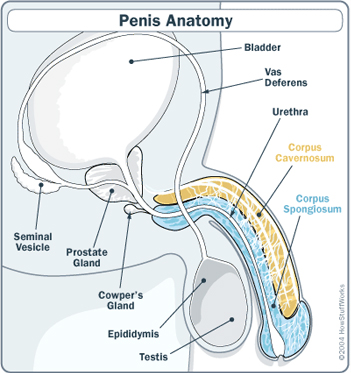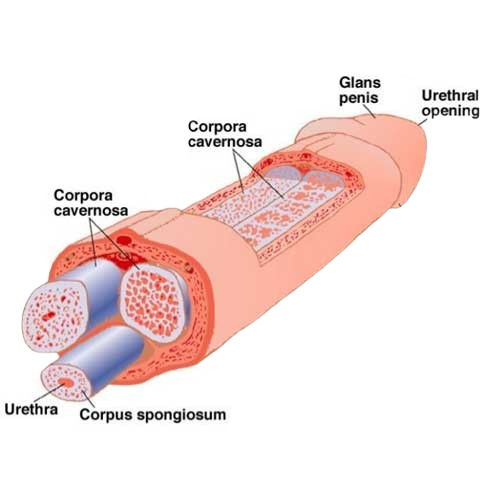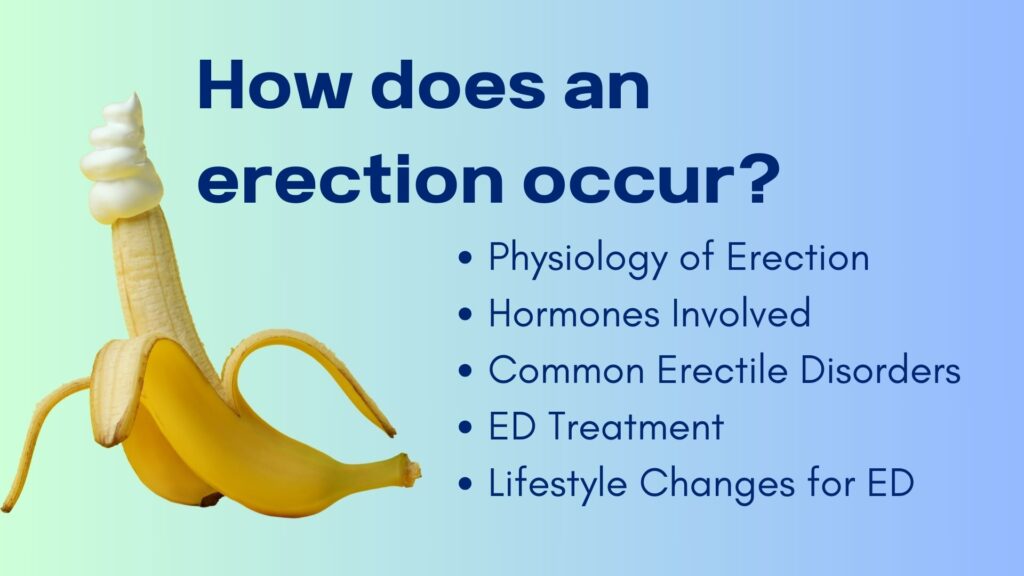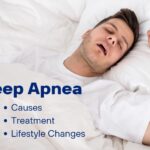Have you ever wondered how a male gets sexually aroused and how that leads to an erection? What is the physiological process of the hardening of the tissue in the penis, and why do some people not get a proper erection or experience erectile dysfunction?
These questions delve into the intricate mechanisms of male sexual physiology, highlighting the crucial role of neurological, vascular, and hormonal factors in achieving and maintaining erections. Understanding these processes is not only of scientific interest but also holds significant clinical relevance in addressing issues like erectile dysfunction (ED).
In this blog, we aim to cover the scientific intricacies behind male erections, including:
- The anatomy of the male reproductive system and key erectile tissues.
- Neurological and hormonal control mechanisms involved in erection.
- The stages and physiological process of erection.
- Factors affecting erections and common causes of erectile dysfunction (ED).
- Available treatment options for ED and the importance of seeking appropriate medical advice.
Anatomy of Male sexual organ
The male reproductive system comprises several key anatomical structures vital for the process of erection and sexual function. The primary structures include the penis, testes, vas deferens, and erectile tissues such as the corpora cavernosa and corpus spongiosum. The testes, located within the scrotum, are responsible for producing sperm and testosterone, a hormone essential for maintaining male sexual characteristics and libido. The vas deferens serve as a conduit for sperm transport during ejaculation.

The penis consists of three cylindrical masses of erectile tissue: two corpora cavernosa on the dorsal side and one corpus spongiosum on the ventral side. These tissues are supplied with blood vessels, including arteries and veins crucial for blood flow regulation during erection.
Erectile tissues, notably the corpora cavernosa, play a central role in the erection process. When stimulated by sexual arousal, these tissues undergo vasodilation. Vasodilation is the widening of blood vessels, leading to an increase in its diameter. This allows for more blood to flow through the blood vessel resulting in penile rigidity necessary for sexual intercourse.
How does a person achieve erection?
The process of achieving and maintaining an erection involves a complex interplay between neurological, vascular, and muscular systems. However, it will not be wrong to say that erection begins in the brain! Both neurological and hormonal mechanisms regulate this process of erection.
Neurological Control of Erection
The central nervous system (CNS), particularly the brain, initiates and coordinates the erectile response. Sensory stimuli from genitalia or sexual thoughts trigger neural signals that travel through the spinal cord to specific regions in the brain, notably the hypothalamus and limbic system. These brain areas are crucial for processing sexual stimuli and initiating the physiological responses associated with sexual arousal.
Upon such stimulation, the brain releases neurotransmitters such as dopamine and acetylcholine. Dopamine, known for its role in pleasure and reward pathways, contributes to the sensation of sexual pleasure and arousal. Acetylcholine facilitates the transmission of nerve impulses between neurons involved in the erectile process.
Yet another crucial neurotransmitter involved in erection is Nitric oxide (NO). It is released from nerve endings and endothelial cells in response to sexual stimulation. Nitric oxide promotes vasodilation (widening of blood vessels) in the penile arteries by relaxing smooth muscle cells in their walls. This vasodilation allows increased blood flow to the erectile tissues (corpus cavernose) of the penis, leading to erection.
Maintaining Erection
The penis contains two chambers known as the corpora cavernosa, extending along its length and housing a network of blood vessels arranged like a sponge. These chambers have spongy spaces that allow them to fill with blood, facilitating erection. Adjacent to the corpora cavernosa is the urethra, a tube responsible for carrying both urine and semen (containing sperm), situated along the underside of the corpora cavernosa.
As blood flow to the penis increases, the spongy tissues within the erectile chambers (Corpus Cavernosa) become engorged with blood. With this engorgement, the tissue becomes harder and longer leading to an erection. This engorgement also compresses the veins that normally drain out blood from the penis. This reduced venous outflow and increased arterial inflow of blood flow maintain the rigidity of the erectile tissues (corpus cavernosa) thus sustaining the erection.

Hormonal Control of Erection
Hormonal factors, especially testosterone, also play a significant role in erectile function. Testosterone is primarily produced in the testes under the control of the pituitary gland. It influences libido (sexual desire), sexual arousal, and the maintenance of erectile tissues’ health.
Another important molecule in the erection process is cyclic guanosine monophosphate (cGMP). Nitric oxide, released during sexual stimulation, activates an enzyme called guanylate cyclase in penile smooth muscle cells. Guanylate cyclase converts guanosine triphosphate (GTP) into cyclic guanosine monophosphate (cGMP). cGMP serves as a secondary messenger that promotes smooth muscle relaxation within the erectile tissues. This relaxation allows the erectile chambers to expand and fill with blood, contributing further to penile rigidity.
Also Read: Premature Ejaculation – Treatment, Diet & Exercises
After sexual stimulation stops, the neurotransmitter levels decrease. cGMP is degraded (by phosphodiesterase enzymes) and smooth muscle contraction resumes. This process, known as ‘detumescence’, leads to the gradual loss of erection as blood flows out of the penis and the erectile tissues return to their non-aroused state.
Medical interventions for managing ED, target these pathways. For example the famous ‘Viagra’ (sildenafil) inhibits the phosphodiesterase enzyme that degrades the erection causing detumescence.
Erectile Dysfunction: Factors Affecting Erection
Several factors can influence erectile function, ranging from physiological to psychological aspects.
Physiological Factors:
- Vascular Health: Conditions affecting blood flow, such as atherosclerosis or hypertension, can impede adequate blood supply to the penis, leading to erectile difficulties.
- Neurological Disorders: Damage to nerves involved in the erection process, as seen in conditions like diabetes or spinal cord injuries, can disrupt neural signals required for achieving and maintaining erections. Neurological conditions such as Peripheral Neuropathy, Multiple Sclerosis (MS) and Parkinson’s Disease also can impact erectile responses
- Hormonal Imbalances: Low testosterone levels, often associated with poor lifestyle, ageing or certain medical conditions (hypogonadism), can contribute to reduced libido and erectile dysfunction. Imbalances in thyroid hormones is yet another factor that can influence sexual function causing ED
- Medication Side Effects: Certain antidepressant medications, especially selective serotonin reuptake inhibitors (SSRIs), can have side effects that include delayed ejaculation and erectile difficulties. Some medications used to treat high blood pressure or psychiatric disorders also can affect erectile function as a side effect.
Psychological Factors:
- Stress and Anxiety: Psychological stressors, including work-related stress or relationship issues, can negatively impact sexual arousal and performance.
- Depression: Mood disorders like depression can affect libido and overall sexual satisfaction, leading to difficulties in achieving erections.
- Performance Anxiety: Fear or anxiety about sexual performance can create a cycle of stress and erectile difficulties, further exacerbating the problem.
Lifestyle Factors:
- Smoking and Alcohol: Tobacco use and excessive alcohol consumption can damage blood vessels and impair blood flow, contributing to erectile dysfunction.
- Obesity and Physical Activity: Being overweight or obese is linked to hormonal imbalances and cardiovascular issues that can impact erectile function. Regular physical activity can improve overall vascular health and sexual function.
- Dietary Habits: Poor dietary choices, high in saturated fats and sugars, can contribute to obesity and cardiovascular problems, indirectly affecting erectile function.
Also Read: Delayed Ejaculation – Causes & Treatment
Treating Erection Issues
Managing or treating Erectile Dysfunction (ED) involves various modalities, addressing underlying causes, and restoring satisfactory sexual function. They may include oral medications, injections, implants, hormone therapy, counselling and lifestyle modifications. The preferred mode of treating ED depends on the extent of the problem and the underlying cause.
Oral medications, such as phosphodiesterase-5 (PDE5) inhibitors like sildenafil (Viagra) and tadalafil (Cialis), work by inhibiting the enzyme (phosphodiesterase) that reduces erection. This leads to increased levels of cyclic guanosine monophosphate (cGMP), enhancing erectile response.
Also Read: ED – Treatment Strategies
Yet another method involves intracavernosal injections of medications like alprostadil, a prostaglandin E1 analog, directly into the penis. This promotes vasodilation and improves blood flow thereby maintaining erections. For individuals requiring more invasive interventions, penile implants in the form of inflatable or malleable devices can provide mechanical rigidity to the penis, enabling erections as needed. Vacuum erection devices (VEDs), commonly known as penis pumps, create a vacuum around the penis, drawing blood into the erectile tissues to initiate an erection. This erection can be sustained by placing a constriction ring at the base of the penis, maintaining blood flow.
Hormone therapy, particularly testosterone replacement in cases of documented low testosterone levels, can improve libido and erectile function. When it comes to performance anxiety, relationship issues, and psychological barriers contributing to ED, counselling tools such as sex therapy can be helpful
Lifestyle modifications play an extremely crucial role in supporting the erectile function. Adopting a healthy diet, regular exercise, quitting smoking, and moderating alcohol consumption, can improve cardiovascular health, hormonal balance, and overall sexual function. Optimizing the management of underlying conditions like diabetes, hypertension, and neurological disorders through appropriate medical and lifestyle interventions can mitigate their impact on erectile function.
How can we help?
SOLVEMyHealth is an online health and wellness platform specializing in sexual health and sleep disorders. Our team includes urologists and andrologists who provide consultations, prescribe medications when necessary, and facilitate discreet delivery of medicines to manage ED.
We also have a team of lifestyle experts who can create personalized diet and exercise plans, helping individuals transition to healthier lifestyles while managing associated metabolic and lifestyle diseases, including erectile dysfunction (ED). Additionally, our panel of psychologists offers counselling and psychological interventions when needed, ensuring comprehensive support for mental and emotional well-being alongside physical health concerns.










